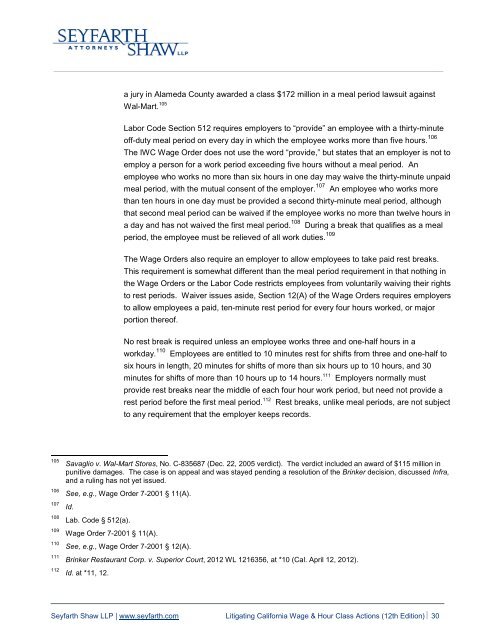Litigating California Wage & Hour and Labor Code Class Actions
Litigating California Wage & Hour and Labor Code Class Actions
Litigating California Wage & Hour and Labor Code Class Actions
You also want an ePaper? Increase the reach of your titles
YUMPU automatically turns print PDFs into web optimized ePapers that Google loves.
a jury in Alameda County awarded a class $172 million in a meal period lawsuit against<br />
Wal-Mart. 105<br />
<strong>Labor</strong> <strong>Code</strong> Section 512 requires employers to “provide” an employee with a thirty-minute<br />
off-duty meal period on every day in which the employee works more than five hours. 106<br />
The IWC <strong>Wage</strong> Order does not use the word “provide,” but states that an employer is not to<br />
employ a person for a work period exceeding five hours without a meal period. An<br />
employee who works no more than six hours in one day may waive the thirty-minute unpaid<br />
meal period, with the mutual consent of the employer. 107 An employee who works more<br />
than ten hours in one day must be provided a second thirty-minute meal period, although<br />
that second meal period can be waived if the employee works no more than twelve hours in<br />
a day <strong>and</strong> has not waived the first meal period. 108 During a break that qualifies as a meal<br />
period, the employee must be relieved of all work duties. 109<br />
The <strong>Wage</strong> Orders also require an employer to allow employees to take paid rest breaks.<br />
This requirement is somewhat different than the meal period requirement in that nothing in<br />
the <strong>Wage</strong> Orders or the <strong>Labor</strong> <strong>Code</strong> restricts employees from voluntarily waiving their rights<br />
to rest periods. Waiver issues aside, Section 12(A) of the <strong>Wage</strong> Orders requires employers<br />
to allow employees a paid, ten-minute rest period for every four hours worked, or major<br />
portion thereof.<br />
No rest break is required unless an employee works three <strong>and</strong> one-half hours in a<br />
workday. 110 Employees are entitled to 10 minutes rest for shifts from three <strong>and</strong> one-half to<br />
six hours in length, 20 minutes for shifts of more than six hours up to 10 hours, <strong>and</strong> 30<br />
minutes for shifts of more than 10 hours up to 14 hours. 111<br />
Employers normally must<br />
provide rest breaks near the middle of each four hour work period, but need not provide a<br />
rest period before the first meal period. 112<br />
to any requirement that the employer keeps records.<br />
Rest breaks, unlike meal periods, are not subject<br />
105<br />
106<br />
107<br />
108<br />
109<br />
110<br />
111<br />
112<br />
Savaglio v. Wal-Mart Stores, No. C-835687 (Dec. 22, 2005 verdict). The verdict included an award of $115 million in<br />
punitive damages. The case is on appeal <strong>and</strong> was stayed pending a resolution of the Brinker decision, discussed Infra,<br />
<strong>and</strong> a ruling has not yet issued.<br />
See, e.g., <strong>Wage</strong> Order 7-2001 § 11(A).<br />
Id.<br />
Lab. <strong>Code</strong> § 512(a).<br />
<strong>Wage</strong> Order 7-2001 § 11(A).<br />
See, e.g., <strong>Wage</strong> Order 7-2001 § 12(A).<br />
Brinker Restaurant Corp. v. Superior Court, 2012 WL 1216356, at *10 (Cal. April 12, 2012).<br />
Id. at *11, 12.<br />
Seyfarth Shaw LLP | www.seyfarth.com <strong>Litigating</strong> <strong>California</strong> <strong>Wage</strong> & <strong>Hour</strong> <strong>Class</strong> <strong>Actions</strong> (12th Edition) 30
















